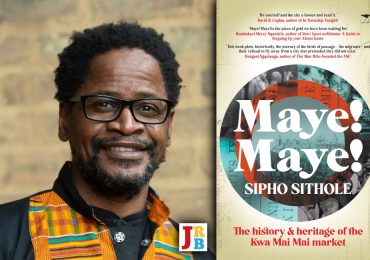One morning at the beginning of February 2009 I was approached by Indra Wussow, founder and curator of The Sylt Foundation and director of jozi art:lab, and Remotewords founders Achim Mohné and Uta Kopp at my family home in Chi Town, Soweto. They wanted to collaborate on a project designed as a crossover of art, literature, design, internet culture and something called ‘navigation technology’. My role in the project was to come up with a suitable name for a place that was still under construction on the eastern side of downtown Johannesburg, around Jeppestown—the place that was, and still is, known as Arts On Main.
I had an idea of where the place was. I had in the past visited The Mai Mai ‘muti market’ next to it several times, as well as the Jeppe Hostel. Also I used to buy my clothes at the shop called Pappas, as well as my Chuck Taylor All-Stars. Jeppestown had also been my place of work in 1993, when I was employed by Republic Umbrella to sell rain and garden umbrellas. This was before I went to Wits University to study African Literature in 1994.
I was excited to be tasked with naming such a place. The difficulty was to come up with a name that had the power to immortalise the place across the project’s many disciplines. A name that would also evoke the creativity and energy around Jeppestown. We were sitting under the apricot tree with my guests in Chi Town and I tried all the names I could think of. The first name that I came up with was eMarabini, inspired by one of my favorite books, The Marabi Dance by Modikwe Dikobe. The reason this was my number one name is because the book is set around Doornfontein in the 1930s, just few blocks from Jeppestown. It explores slum life and the subcultures of the city, some of which we have inherited today. There are also traditional songs and dances called eMarabini and Marabi, respectively, and I thought these lent themselves to the perfect name.
But when my visitors, who were all from Germany, asked what the name meant, I was not clear with my explanation, and the idea began to fade.
Then a miracle happened as we sat under the apricot tree. I thought of my characters in my novel After Tears, and Uncle Nyawana came into my mind. I went inside the house and opened Chapter Two of my novel.
‘I’m glad you finally arrived, my Advo. Good to see you, and welcome to Jozi maboneng, the place of lights,’ says uncle Nyawana to his nephew Bafana Kuzwayo, who hasn’t told anyone yet that he didn’t quite finish his law degree.
And that’s how the name of that place in the eastern part of Johannesburg came into being. It was born from the womb of Chapter Two of my second novel.
I must hasten to add that the name Maboneng was in existence long before my novel, and even myself. The name has been around since the founding of Johannesburg in 1886. But back then it referred to the city as a whole, not just one particular part of it.
Anyway, welcome to Jozi Maboneng, the place of light, the gleam of hope, the mirage of riches and opportunity.
- Niq Mhlongo is City Editor; his latest book is an anthology of short stories, Affluenza; follow him on Twitter
Index
Books
- Marabi Dance by Modikwe Dikobe, After Tears by Niq Mhlongo
Organisations
- jozi art:lab, Remotewords, Republic Umbrella, The Sylt Foundation
Places
- Arts on Main, Chi Town, Jeppestown, Doornfontein, Soweto, Wits University
People
- Uta Kopp, Achim Mohné, Indra Wussow
Topics
- History of Johannesburg





